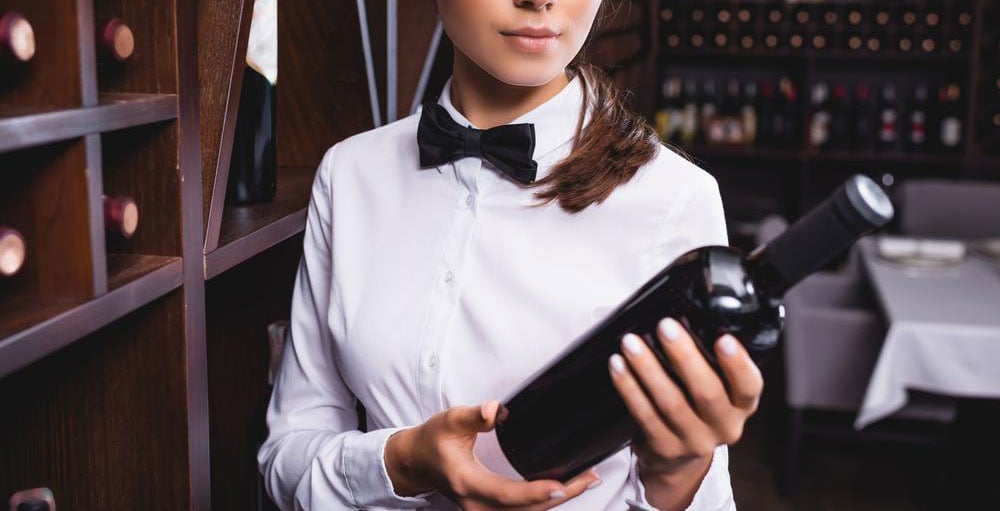Alcohol safety is part of the job — learn more about your responsibilities as an alcohol server.
Serving alcohol is a great role for someone who loves to meet and make connections with different kinds of people. Each day at work as an alcohol server is different and you get to work in a creative and fun social atmosphere. What stays constant, though, is an alcohol server’s responsibility to ensure their customers are enjoying their drinks safely.
It’s part of an alcohol server’s job to ensure they do not overserve customers and do not serve people under the legal drinking age. To do this, alcohol servers must check ID, look for physical and behavioral signs of intoxication and stop service to intoxicated customers. Learn more about your responsibilities as an alcohol server and get the knowledge you need to do the job effectively.
Checking ID
The legal drinking age in the United States is 21. As an alcohol server, it’s part of your job to make sure you do not sell or serve alcohol to someone under the legal drinking age. Those who serve alcohol to a minor can be charged with a misdemeanor.
The best way to prevent serving alcohol to a person under 21 is to check ID. Alcohol servers must check ID to:
- review the birthdate on the ID and confirm the individual is 21 or older
- ensure the person is not using a fake ID
Observing customers for signs of intoxication
You should observe your customers’ behavior from the moment they enter the business. This gives you a reference point to compare to as they drink, making it easier to spot behavioral changes as they become more intoxicated.
Behavioral signs of intoxication include decreased alertness, uncoordinated movements, slow reaction times and pronounced confusion. Knowing the 5 Stages of Intoxication, along with the common behavioral and physical signs related to each stage, will help you determine when a person is intoxicated and when to stop service.
If a person arrives at your business already intoxicated, it’s also your responsibility to refuse service.
Counting drinks
Another way to estimate a person’s intoxication level is to count the number of drinks they’re having. An alcohol server should know the standard serving size of an alcoholic drink and the serving size of each alcoholic drink their establishment serves.
Counting drinks helps alcohol servers estimate a person’s Blood Alcohol Concentration (BAC) level and ultimately, how intoxicated a person is. To estimate a person’s BAC:
- count the number of drinks they’ve had
- estimate their weight
- use a BAC chart to estimate their BAC level
Once a person reaches a BAC of .08%, they are at the legal limit for intoxication and are not permitted to drive.
Stopping service to intoxicated customers
If a customer shows signs of intoxication or if you’re concerned with the number of drinks they’ve had, it’s your responsibility as an alcohol server to stop service. Let your manager know when you’re stopping service and ensure that everyone on staff is aware so that the customer does not accidentally get served more drinks.
Stopping service is often an uncomfortable part of the job and can sometimes even lead to dangerous situations. Remember that ultimately, stopping service is done to ensure everyone’s safety, including yours! Use our proven techniques to use when stopping service and if you feel that the situation may escalate, we’ve also put together tips for safely stopping alcohol service that include tactics you can use to defuse potentially dangerous circumstances.
When stopping service, also ensure that customers have a safe way to get home. Check if they have a designated driver or offer to call a friend, cab or designated driver program.
Logging incidents
Incidents like stopping service or seizing a fake ID must be documented in the business’s log book. This might be the alcohol server’s responsibility, or perhaps the manager’s, but the business must ensure that incident logs are completed. Incidents that should be documented include:
- refusal of service
- seizing a fake ID
- stopping service
- injuries or medical incidents
- illegal or violent incidents
The date, time and description of the incident should be included in the log, as well as any steps taken to handle the situation.
Following any additional business procedures
Alcohol servers must be trained in specific business procedures. This can vary from business to business, but ensure that you know and follow any additional processes outlined by your employer. These can include:
- how to handle illegal activity
- how to handle emergency situations
- how to handle potentially violent situations
- serving one drink per customer at a time
- when to arrange alternate transportation
- when to call law enforcement for assistance
- how to interact with law enforcement and the liquor authority
Completing alcohol server training
In some states, it’s required by law for all alcohol servers to complete alcohol server training and obtain an Alcohol Server Certificate. You should know what’s required to be able to serve alcohol in your area. Regardless of whether alcohol server training is required, it’s always a good idea to get your certificate so that you have the tools and knowledge you need to serve alcohol safely and responsibly.
Our Alcohol Server Training Programs provide in-depth, state-specific training. Our training covers the impacts of alcohol on the body, how to observe signs of intoxication, techniques for stopping service and the roles of law enforcement and the liquor authority. We know that being an alcohol server comes with big responsibilities. We’re here to help! Learn how to safely serve alcohol with Userve.

